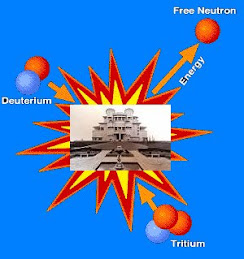Internet Archive (MP4 - 221MB)» Download this transcript (PDF)
When I expose material to an external magnetic field, then we learned last time that the field inside that material is modified.
And we expressed that in terms of an equation, that the field inside the material is kappa of M, which is called the relative permeability, times the external field, and I will refer to that all the time as the vacuum field.
And when we have diamagnetic material, kappa M is just a hair smaller than one; with paramagnetic material, it is a hair larger than one; but when we have ferromagnetic material it can be huge.
It can be thousands, 10 thousands, and even higher.
Now in the case of para- and ferromagnetic material, the kappa of M is the result of the fact that the intrinsic dipoles of the atoms and the molecules are going to be aligned by the external field.
And today I want to raise the question, how large can the magnetic dipole moment of a single atom be?
And then comes the logical question, how strong can we actually, then, have a field inside ferromagnetic material?
That means if we were able to align all the dipole moments of all the atoms, what is the maximum that we can achieve?
To calculate the magnetic dipole moment of an atom, you have to do some quantum mechanics, and that's beyond the scope of this course.
And so I will derive it in a classical way, and then at the very end I will add a little pepper and salt, which is quantum mechanics, just to make the result right.
But it can be done in a classical way, and it can give you a very good, good idea.
If I have a hydrogen atom, which has a proton at the center, has a charge plus e -- e is the charge of the electron but this is the plus charge.
And let this have an orbit R, circular orbit.
And the electron here e, I'll give it the minus sign to make sure that you know that it's negative.
Say the electron goes around in this direction.
This is the velocity of the electron.
That means that of course the current around the proton would then be in this direction.
If an electron goes like this, the current goes like that, that's just by convention.
The mass of an electron -- you should know that by now -- is approximately 9.1 times 10 to the -31 kilograms.
The charge of the electron, 1.6 times 10 to the -19 coulombs.
And the radius of the orbit in a hydrogen atom -- it's often called the Bohr radius, by the way -- is approximately 5 times 10 to the -11 meters.
We're going to need these numbers.
That's why I write them down for you.
If you look at this current running around the proton, it's really a current which the current, say, goes in this direction.
And here is that proton -- trying to make you see three dimensionally.
Then it creates a magnetic field in this direction, and so the magnetic dipole moment mu is up.
And the magnitude of that magnetic dipole moment, as we learned last time, is simply this current I times the area A of this current loop.
Now the area A is trivial to calculate.
That's pi R square, R being the radius of the orbit.
And so A, that's the easiest, is pi R squared.
And if I use my 5 times 10 to the minus 11, then I find that this area is 8 times 10 to the -21 square meters.
So that's easy.
But now comes the question, what is I?
What is the current?
So now we have to do a little bit more work.
And we have to combine our knowledge of, uh 8.02 with our knowledge of 8.01.
If this electron goes around, the reason why it goes around is that the proton and the electron attract each other.
And so there is a force in this direction.
And we know that force, that's the Coulomb force.
It's an electric force.
That force is this charge times this charge, so that's e squared, divided by our famous 4 pi epsilon 0, and then we have to divide it by the radius squared.
So that's Coulomb's Law.
But from 8.01, from Newtonian mechanics, we know that this is what we call the centripetal force that holds it in orbit, so to speak, and that is M V squared, M being the mass of the electron, V being the speed of the electron, and V squared divided by R.
And so this allows me to calculate as a first step, before we get into the current, what the velocity of this electron is.
It's phenomenal.
It's an incredible speed.
So V then becomes -- I lose one R -- so I get the square root, I get an e squared upstairs here, my M goes downstairs, I have 4 pi epsilon 0, and I have here an R.
And I know all these numbers.
I know what e is, I know what capital R is, I know what 4 pi epsilon 0 is -- one over 4 pi epsilon 0 is the famous 9 to the power -- 9 times 10 to the power 9.
And so I can calculate what V is.
And if I stick in the numbers and if I did not make a mistake, then I find about 2.3 times 10 to the 6 meters per second.
It's an immensely high speed, 5 million miles per hour.
If this were a straight line, you would make it to the moon in three minutes.
5 million miles per hour this electron goes around the proton.
Now I have to go to the current.
I have to find out what the current is.
So the question that I'm going to ask now is how long does it take for this electron to go around.
Well, that time, capital T, is of course the circumference of my circle divided by the speed of the electron.
Trivial.
Even the high school students in my audience will understand that one, I hope.
And so I know what 2 pi R is, because I know R and I know V and so I can calculate that time, just by sticking in the numbers.
And I find that it is about 1.14 times 10 to the -16 seconds.
Just imagine how small that time is.
You cannot even -- we cannot even imagine what it's like.
It goes 10 to the 16 times per second around, because it has this huge speed.
The 1.14 times 10 to the -16 really should have been 1.4 times 10 to the -16.
Of course, it doesn't make much difference, but in case you substitute in the numbers, it is 1.4 times 10 to the -16.
Now, we still haven't found the current, but we're almost there.
Because when you look here, there is this electron going by, and every 1.14 10 to the -16 seconds, that electron goes by.
So the current I, that's the definition of current, is the charge per unit time.
And so every capital T seconds, the charge e goes by, and so this is per definition the current.
And so this current, then, that you have, which is simply due to the electron going around the proton, is about 1.1 times 10 to the -3 amperes.
And that is mind-boggling.
A milliampere.
One electron going around a proton represents a current of a milliampere.
And now of course I have the magnetic moment mu, that is I times A.
We already calculated A, and now we also have the current I, and so we now get that mu is approximately 9.3, if you put in all the decimals correctly, times 10 to the -24, and the unit is of course amperes square meters.
This is area, and this is current.
This A has nothing to do with that A, hey.
This is amperes.
Be careful.
And this is square meters.
But these are the units.
And this has a name.
This is called the Bohr magneton.
Bohr magneton.
What we cannot understand with our knowledge now, but you can if you ever take quantum mechanics, that the magnetic moment of all electrons in orbit can only be a multiple of this number, nothing in between.
Quantum mechanics, the word says it is quantization.
It's not in between.
It's either or.
It includes even 0, which is even harder to understand, that it can even be 0.
In addition to a dipole moment due to the electron going around the proton, the electron itself is a charge which spins about its own axis, and that also means that a charge is going around on the spinning scale of the electron.
And that magnetic dipole moment is always this value.
And so the net magnetic dipole moment of an atom or a molecule is now the vectorial sum of all these dipole moments, all these electrons going around, means orbital dipole moments, and you have to add the spin dipoles.
Some of these pair each other out.
One electron would have its dipole moment in this direction and the other in this direction, and then the vectorial sum is 0.
The net result is that most atoms and molecules have dipole moments which are either one Bohr magneton or 2 Bohr magnetons.
That is very common.





Tidak ada komentar:
Posting Komentar